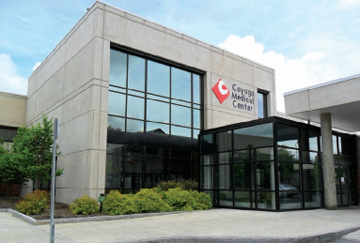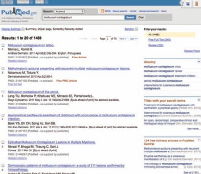Weill Cornell faculty give MDs at Ithaca's Cayuga Medical Center a primer on navigating research resources
Weill Cornell faculty give MDs at Ithaca's Cayuga Medical Center a primer on navigating research resources
'The half-life of medical knowledge is finite," says Adam Law, an endocrinologist at Ithaca's Cayuga Medical Center (CMC) and a clinical assistant professor of medicine at Weill Cornell Medical College. "I was told it was seven years when I started medical school. Now it's probably three or four." Doctors don't stop studying when they graduate from med school; the ever-evolving nature of medical science makes continuing education an inherent—and required—part of a physician's career.

Through a growing partnership between Cornell and CMC, Medical college faculty are offering continuing education to Ithaca-based MDs—despite the fact that the med school is located 200 miles away in Manhattan. Last fall, public health professor Madelon Finkel and Helen-Ann Brown Epstein, head of education and outreach at the Weill Cornell Medical Library, taught a ten-week course in evidence-based medicine—a burgeoning field in which knowledge gleaned through the scientific method is brought to bear on clinical practice. "We wanted to do something that affects the practice of all doctors," says Law, who helped launch the course during his term as CMC staff president, "not a specific content area like heart failure or varicose veins, but something that every doctor has to know about." A case-based primer in navigating online research resources seemed an ideal first topic for what is hoped to be an annual offering, Law says. "This is the first time these three campuses were integrated in this way, where you had physicians affiliated with Cayuga Medical Center participating in a course taught by Weill Cornell faculty and housed in facilities at Cornell University," Law says. "I think it's a fantastic precedent."
The course is just one way that physicians at CMC and Weill Cornell have been working together, as leaders of the two institutions promote collaborative efforts to enrich both. For example, Weill Cornell grand rounds have been simulcast in Ithaca; Medical college faculty are giving individual continuing education lectures, both in person and remotely; and CMC physicians have received faculty appointments at Weill Cornell and are helping to train students and residents. "The physician groups in New York City and Ithaca are getting to know each other better," says President David Skorton. "It's a very positive relationship in both directions."

On a Thursday night last December, a dozen CMC physicians gathered in a Cornell classroom, wired for distance learning, for a meeting of the evidence-based medicine course. From the Manhattan campus, Finkel and Epstein led a discussion on molluscum contagiosum, a viral skin infection that one of the participants, a pediatrician, had just seen in a two-a-half-year-old girl. The question at hand: is a severe outbreak of the disease associated with immunosuppression?
"It's spread by direct skin-to-skin contact," Finkel noted. "So do you think she gave it to her brothers? Or they had it first?"
"She's the youngest, so the brothers had it first," the pediatrician offered. "It's a very common skin condition. What's unusual is that she had such a large flare."
"She's not HIV positive?" Finkel asked. "Or any of the boys?"
"She tested negative at birth, and we have only that test to go on," said the pediatrician. "I don't know how long she's had it, but at least several months, and it has just recently flared. When she came in today, her diaper area was covered with it."
For the next hour, Finkel and Epstein guided the physicians through online searches of the medical literature using resources like the research aggregation site PubMed, aiming to see if the toddler's skin infection could herald immune issues—and how she might best be treated. (Throughout the discussion, the participants viewed the teachers on one screen while a second showed the desktop of Epstein's computer.) They found intriguing, potentially relevant studies in sources like the International Journal of Dermatology, but no definitive answer. "These are real-world issues," Finkel said. "These are patients coming into your office every day. Sometimes a perfect article will appear and tell you exactly what you need to do and everything is marvelous and wonderful—and in other cases it takes more searching. But I think we arrived at a couple of suggestions to further test the young girl as well as her brothers to rule in or rule out possibilities." Epstein suggested consulting a textbook, possibly in dermatology, immunology, or pediatrics. "See if you can get a bit more background before you jump to the journal literature," she said. Added Finkel: "Sometimes PubMed is just not going to do it for you."
CMC emergency physician David Feldshuh took the course with the aim of expanding his knowledge as evidence-based approaches become increasingly important; he also craved some practical advice on researching a medical condition affecting his 100-year-old mother. "The teachers were very gracious, open to questions, and flexible," says Feldshuh, a clinical instructor of emergency medicine at the Medical college who is also a professor of theatre at Cornell. "The course introduced me to a new vocabulary, and the distance learning part—if not completely natural—is a great way to make things possible that might otherwise not happen."
— Beth Saulnier


